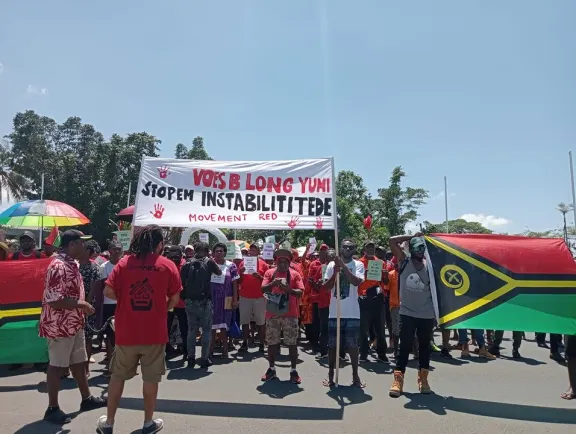Vanuatu was voting on Wednesday in its first referendum since independence, with citizens asked to decide on proposed constitutional amendments aimed at preventing party hopping and curbing political instability in the South Pacific nation.
The referendum asks ni-Vanuatu a simple “yes” or “no” on whether they support inserting two articles into the constitution that are designed to strengthen the country’s fragmented party system.
Advocates hope the changes will stop lawmakers from switching parties and put an end to no-confidence motions that have toppled numerous governments since the end of joint British and French rule in 1980.
In 2022-23 alone, Vanuatu had four different prime ministers from four different parties.
“I voted ‘yes’ this morning because the country is in chaos,” Paul Ren Tari, a former member of parliament from Maemo island, told BenarNews in the capital Port Vila.
“We lost Air Vanuatu, we lost everything – so we have to stabilise the country so that MPs won’t jump in and out,” said Tari, 60.
The referendum proposes changing the constitution so that any lawmaker who leaves or is expelled from a political party during the parliamentary term loses their seat. The second amendment would force MPs to vacate their seat if they do not declare a party affiliation within three months of Parliament’s first sitting day.
The reforms, which were approved by Vanuatu’s 52-member parliament in December last year, require a simple majority to be enacted. Results are expected on June 10.
Officials have set up 379 polling booths across the archipelago nation of 300,000 people, as well as in Fiji, New Caledonia, Australia and New Zealand.
Minister of Internal Affairs Johnny Koanapo said last week that the government’s three-month referendum awareness campaign had been comprehensive and urged people to vote. The amendments, he said, were “absolutely necessary to anchor stability.”
But some voters like David Semenou, from Epi Island, said the referendum had been rushed.
“I was familiar with the purpose of the referendum, but my view is that the overall population of our nation does not understand,” Semenou, 37, told BenarNews outside a polling station in Port Vila.
Another voter, Leisong Sisi, from Nguna Island, said people could have benefitted from more awareness on why the referendum was necessary.
Vanuatu, about 1,900 kilometers (1,180 miles) northeast of the Australian city of Brisbane, has long struggled with fractious parliamentary politics and short-lived governments.
Although it has seen almost no political violence on the scale of its Melanesian neighbors, numerous governments have been ousted by no-confidence motions.
“While it is recognised that [the amendments] are not a silver bullet for political instabilities, leaders acknowledged that they need to begin somewhere and walk through a series of political reforms that would certainly contribute to stability,” said Gregoire Nimbtik, who has extensive experience working for the Vanuatu government, including most recently as the director-general of the Ministry of the Prime Minister.
Papua New Guinea, Fiji and the Solomon Islands have introduced similar anti-party hopping laws to mixed results.
The lesson from those countries was that legislation with loopholes could easily be exploited by wily politicians, as would almost certainly be the case in Vanuatu, according to Jon Fraenkel, a comparative politics professor at Victoria University of Wellington.
“The best case scenario is they don’t work and don’t have any effect,” he told BenarNews. “The worst case is that they create enormous political tensions and lots of court litigation.”
The amendments were poorly drafted and contained “plenty of scope for abuse,” Fraenkel said.
The first amendment, 17A, empowers the speaker and party presidents to impose discipline, but many parties’ internal rules were not strong enough to ensure this authority was not misused, he said.
“It is left up to party presidents to expel members if they are believed to have defied the party constitution, so it requires the constitutions are very well written,” he said.
“Then if the party president decides that, he refers the matter to the speaker. But the speaker is a political appointee, so therefore they are likely to take action only if it is in their interest.”
Amendment 17B was even more problematic because it was an attempt to limit independent members and one-person parties from parliament, Fraenkel said.
The government was dealt some good news on Monday when the Supreme Court of Vanuatu dismissed a judicial review challenging the referendum.
The so-called No group had argued that outlawing changes of political allegiance during a parliamentary term and banning independents was unconstitutional. But Chief Justice Vincent Lunabek rejected the lawsuit, lifting a final hurdle for the vote to commence.
Politicians were “working around the clock” to reform their party constitutions to make them more democratic, transparent and accountable alongside the amendments, said Nimbtik.
“It is believed that this will provide checks and balances and also create a democratic decision-making process,” he said, adding the Political Parties Registration Act passed late last year was aimed to aid this process.
Many voters hope the constitutional amendments will improve government decision-making and delivery of services.
“When I heard that this referendum would take place, I felt that I had to participate,” Semenou said.
“If the vote for the referendum and reform is successful, there will be a more stable government and we can have more development,” he said.














